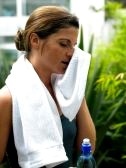You are here
A Highly Effective, All-Natural Mosquito Repellent
It's no secret that mosquito bites can transfer a number of diseases to humans and animals, the most common of which are malaria, dengue fever, and encephalitis (inflammation of the brain).
Before you whip out a can of mosquito-repelling spray the next time a clan of biting insects are after your blood, you should know that many conventional brands contain DEET, a powerful pesticide that has been linked to a number of health problems such as skin rashes, dizziness, and even seizures.
According to recent studies by researchers at Duke University, regular and prolonged exposure to DEET via topical application, especially when used together with other pesticides or chemicals, causes significant brain cell death and behavioral changes in laboratory rats.
The American Academy of Pediatrics recommends that children under six years of age are not exposed to repellents that contain more than 10 percent DEET. The Academy also recommends that infants less than two months old are not exposed to any DEET whatsoever.
 Rather than expose yourself to the toxic effects of DEET and other pesticides, I encourage you to try an all-natural formula made with essential plant oils that have long been used all over the world to provide natural protection against biting pests.
Rather than expose yourself to the toxic effects of DEET and other pesticides, I encourage you to try an all-natural formula made with essential plant oils that have long been used all over the world to provide natural protection against biting pests.
I experimented with a number of different natural formulas last summer while playing with our boys in our backyard, and the formula that I found to be most effective contains:
-
Citronella Oil - a natural plant oil that has been registered as a natural insect repellent in the United States since 1948. The United States Environmental Protection Agency considers citronella oil to be a natural biopesticide with a non-toxic mode of action.
-
Lemongrass Oil - also a natural plant oil that has long been used in tropical and subtropical regions as a natural insect repellent.
-
Peppermint Oil - has also long been used as a natural bug repellent, and is particularly good for keeping mosquitoes away.
-
Vanillin - not artificial vanilla, but the real stuff that we know acts as a natural bug repellent.
-
Deionized Water
Not only does this natural formula outperform the vast majority of repellents that contain DEET, its essential oils are good for your skin, and combine to create a pleasant fragrance.
Our highly effective natural bug repellent is:
-
Chemical-free
-
Eco-friendly
-
Biodegradable
Being eco-friendly and biodegradable is particularly important in case you need to take your bug spray with you to some areas in Mexico and the Caribbean where they require such products to be biodegradable.
And of course, it's optimal to only use non-toxic and eco-friendly products in your yard - this is good for the health of your loved ones, including pets, and of course, it's good for your local surroundings.
 Using a DEET-free, all-natural formula to keep biting insects away is particularly important for children, whose nervous systems are more sensitive to environmental toxins than those of adults.
Using a DEET-free, all-natural formula to keep biting insects away is particularly important for children, whose nervous systems are more sensitive to environmental toxins than those of adults.
So if you have children who spend a lot of time outdoors in areas that are known for annoying biting pests, I encourage you to give this formula a try.
Here are some other suggestions that I've found to be helpful in preventing potentially dangerous bites by mosquitoes and other bugs:
-
When you're outdoors, strive to wear light-colored clothing. Many mosquitoes use their vision to locate targets from a distance; dark clothing and rich foliage are prime attractants.
-
Whenever practical, try not to be outdoors for long stretches at a time when you are hot. You release more carbon dioxide when you are hot, and carbon dioxide is a major attractant of mosquitoes.
-
 Try not to be outdoors after an intense workout. Vigorous exercise can result in significant lactic acid build-up in your muscles, and lactic acid is a strong attractant of mosquitoes.
Try not to be outdoors after an intense workout. Vigorous exercise can result in significant lactic acid build-up in your muscles, and lactic acid is a strong attractant of mosquitoes. -
Don't eat salty foods. Eating salty foods can cause you to produce higher-than-normal amounts of lactic acid.
-
Wipe off perspiration on a regular basis. Perspiration attracts mosquitoes via the chemicals contained within. Perspiration increases the humidity around your body, which also attracts mosquitoes.
-
If possible, stay away from pools of water. Even mud puddles and moist plants attract mosquitoes.
Of course, when it's not practical to heed the suggestions above (and there are plenty of times when this holds true, especially for active adults and children), you can use an all-natural anti-bug spray to protect yourself.
 But keep in mind that natural plant oils typically need to be re-applied on a regular basis, as they wear off more quickly than conventional bug sprays that contain DEET and other harsh chemicals.
But keep in mind that natural plant oils typically need to be re-applied on a regular basis, as they wear off more quickly than conventional bug sprays that contain DEET and other harsh chemicals.
Also, be sure to re-apply regularly in the following circumstances that may lower repellent effectiveness:
-
Dilution by rain or swimming
-
Quick evaporation due to wind and/or high temperatures
Our all-natural formula of essential oils is highly effective at repelling mosquitoes, ticks, fleas, chiggers, and other biting insects away. And though one application lasts up to three hours, be sure to re-apply more frequently under the circumstances mentioned above.
Just one bottle seemingly lasts forever, so you likely won't need more than a single bottle for an active family for an entire summer; we're still using the same bottle that we used last summer, and my guess is that it will last us through this season as well.
If you have friends and extended family members who don't know about the potential dangers of using repellents that contain DEET, you might consider giving a bottle of our formula as a gift, especially if they are outdoors a lot and/or have young children.
Directions: Shake well before applying. Apply on exposed skin as often as needed - about once every 2-3 hours works well for most people. For added protection, spray on clothing as well.
Caution: Avoid contact with eyes and lips. Spray onto hands to apply to face and ears. Adults apply to children and don't apply to hands of children. Do not inhale. If irritation occurs, wash area with soap and water and discontinue use. Do not use on children under 6 months of age without consulting with a licensed physician. Keep out of reach of children.
Please note: Trace amounts of sodium benzoate and potassium sorbate are included as natural preservatives to prevent growth of undesirable organisms. These preservatives are naturally occurring. For example, sodium benzoate is found in plant foods like cinnamon, plums, and even apples.
Click here to order a bottle of our all-natural anti-bug spray.
 If you're not completely satisfied with how effective this bug spray is, simply let me know and I'll see to it that you're given a full refund minus shipping.
If you're not completely satisfied with how effective this bug spray is, simply let me know and I'll see to it that you're given a full refund minus shipping.
Join more than 80,000 readers worldwide who receive Dr. Ben Kim's free newsletter
Receive simple suggestions to measurably improve your health and mobility, plus alerts on specials and giveaways at our catalogue
Please Rate This
Highest Rated | Related Posts | ||











Comments
Another natural mosquito repellant
Another natural repellent that I have found is Vitamin B1 - also known as Thiamin Monostrate.
When I was traveling to Fiji I was being eaten by mosquitoes during sundown. I by chance read in one of my travel guides that Vitamin B1 repelled mosquitoes. I figured I had nothing to lose.
It definitely deterred the insects. Once I started taking it, I was not getting bit at all. It was amazing.
Plus you can't beat the additional benefits of Vitamin B1 as it helps the energy and the metabolism.
Smell of that repellent
I would like to hear from anyone who used this repellent whether it has the same terrible smell as the regular ones. That is what really "repells" me off them, I cannot stand that smell!
Thanks, Anna
Natural Insect Repellent
I have found that if you eat very little to no white sugar in your diet, that the mosquitos will go to those around you who do eat sugar, leading me to believe that they can definitely tell a difference in body odor. I also discovered that I could perspire profusely and still have no body odor when I cut white sugar out of my diet for a period of time.
Also I have found that using Tea Tree Oil seems to work well. It has a strong fragrance, but worth it compared to getting eaten up. I was originally told about this by my regular medical doctor who tried it on a back country trip and said it worked as well for him as Deep Woods Off.